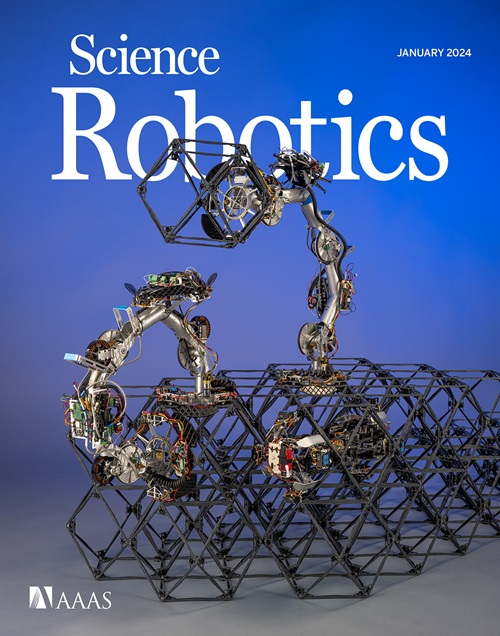Biohybrid microrobots regulate colonic cytokines and the epithelium barrier in inflammatory bowel disease
IF 26.1
1区 计算机科学
Q1 ROBOTICS
引用次数: 0
Abstract
Cytokines have been identified as key contributors to the development of inflammatory bowel disease (IBD), yet conventional treatments often prove inadequate and carry substantial side effects. Here, we present an innovative biohybrid robotic system, termed “algae-MΦNP-robot,” for addressing IBD by actively neutralizing colonic cytokine levels. Our approach combines moving green microalgae with macrophage membrane–coated nanoparticles (MΦNPs) to efficiently capture proinflammatory cytokines “on the fly.” The dynamic algae-MΦNP-robots outperformed static counterparts by enhancing cytokine removal through continuous movement, better distribution, and extended retention in the colon. This system is encapsulated in an oral capsule, which shields it from gastric acidity and ensures functionality upon reaching the targeted disease site. The resulting algae-MΦNP-robot capsule effectively regulated cytokine levels, facilitating the healing of damaged epithelial barriers. It showed markedly improved prevention and treatment efficacy in a mouse model of IBD and demonstrated an excellent biosafety profile. Overall, our biohybrid algae-MΦNP-robot system offers a promising and efficient solution for IBD, addressing cytokine-related inflammation effectively.
生物杂交微型机器人调节炎症性肠病的结肠细胞因子和上皮屏障
细胞因子已被确定为导致炎症性肠病(IBD)的关键因素,但传统治疗方法往往被证明是不够的,而且有很大的副作用。在这里,我们提出了一种创新的生物混合机器人系统,称为 "藻类-MΦNP-机器人",通过主动中和结肠细胞因子水平来治疗 IBD。我们的方法将移动的绿色微藻与巨噬细胞膜包裹的纳米颗粒(MΦNPs)结合起来,"在飞行中 "有效捕捉促炎细胞因子。动态藻类-MΦNP-机器人通过持续移动、更好的分布和在结肠中更长时间的滞留,提高了细胞因子的清除率,从而优于静态机器人。该系统被封装在口服胶囊中,使其免受胃酸影响,并确保在到达目标疾病部位后发挥作用。由此产生的海藻-MΦNP-机器人胶囊能有效调节细胞因子水平,促进受损上皮屏障的愈合。它在小鼠 IBD 模型中显示出明显的预防和治疗效果,并具有良好的生物安全性。总之,我们的生物杂交藻类-MΦNP-机器人系统为治疗 IBD 提供了一种前景广阔的高效解决方案,可有效解决与细胞因子相关的炎症问题。
本文章由计算机程序翻译,如有差异,请以英文原文为准。
求助全文
约1分钟内获得全文
求助全文
来源期刊

Science Robotics
Mathematics-Control and Optimization
CiteScore
30.60
自引率
2.80%
发文量
83
期刊介绍:
Science Robotics publishes original, peer-reviewed, science- or engineering-based research articles that advance the field of robotics. The journal also features editor-commissioned Reviews. An international team of academic editors holds Science Robotics articles to the same high-quality standard that is the hallmark of the Science family of journals.
Sub-topics include: actuators, advanced materials, artificial Intelligence, autonomous vehicles, bio-inspired design, exoskeletons, fabrication, field robotics, human-robot interaction, humanoids, industrial robotics, kinematics, machine learning, material science, medical technology, motion planning and control, micro- and nano-robotics, multi-robot control, sensors, service robotics, social and ethical issues, soft robotics, and space, planetary and undersea exploration.
 求助内容:
求助内容: 应助结果提醒方式:
应助结果提醒方式:


